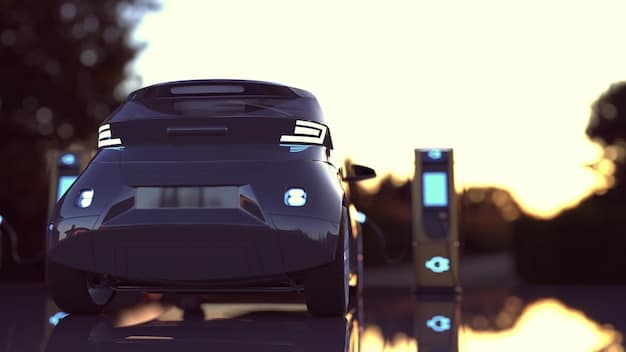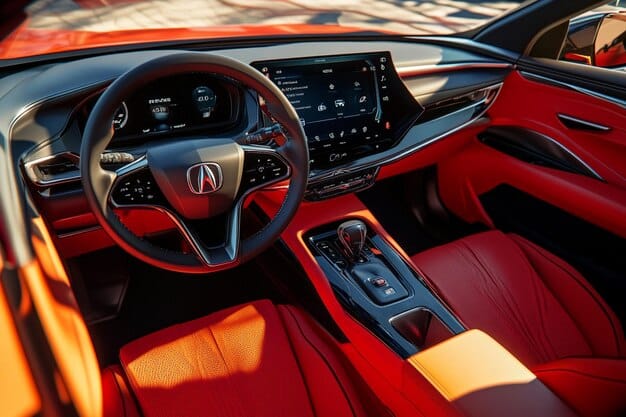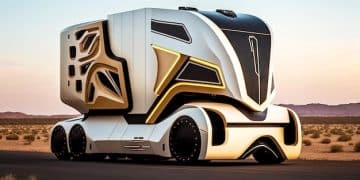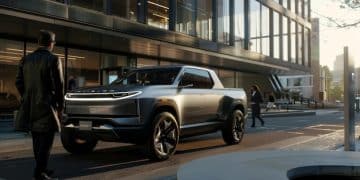2025 SUV Review: Top Models with 28 MPG Fuel Economy

Looking for a fuel-efficient SUV in 2025? Several models are expected to achieve around 28 MPG, balancing economy with the versatility and space SUVs offer, making them ideal for budget-conscious and environmentally aware drivers.
Exploring the 2025 SUV Review: Which Model Offers the Best Fuel Economy at 28 MPG? is now crucial for savvy car buyers aiming to balance efficiency and functionality.
The Rise of Fuel-Efficient SUVs
In recent years, the demand for SUVs has surged, but so has the concern for fuel economy. Automakers are responding by developing SUVs that offer excellent mileage without compromising on space, comfort, or features. This has led to the emergence of several 2025 models projected to achieve around 28 MPG, making them an attractive option for environmentally conscious and budget-minded consumers.
These advancements are driven by technological innovations in engine design, aerodynamics, and lightweight materials, ensuring that SUVs can compete with smaller vehicles in terms of fuel efficiency. Let’s delve into some of the key factors contributing to this trend.
Technological Innovations
Several technological advancements are contributing to the improved fuel economy of 2025 SUVs. These include:
- Advanced Engine Designs: Newer engine technologies such as turbocharging and direct injection enhance fuel combustion, resulting in better efficiency.
- Hybrid and Electric Powertrains: The integration of hybrid and electric systems provides additional power while reducing fuel consumption.
- Aerodynamic Enhancements: Improved vehicle designs minimize drag, allowing SUVs to glide through the air more efficiently.
These innovations collectively make SUVs more fuel-efficient, addressing a critical need in the automotive market. The combination of these technologies ensures that drivers can enjoy the benefits of an SUV without the burden of high fuel costs.

Key 2025 SUV Models to Watch
As we approach 2025, several SUV models are generating buzz for their potential to offer excellent fuel economy. These models combine innovative technologies with practical design, making them ideal for various driving needs. Here are some of the frontrunners.
These SUVs not only promise efficiency but also maintain the comfort and versatility that drivers expect. Let’s take a closer look at their specifications and features.
Expected Models
Several 2025 SUV models are expected to lead the pack in fuel economy:
- Toyota RAV4 Hybrid: Known for its reliability and efficiency, the 2025 RAV4 Hybrid is anticipated to continue its legacy of excellent MPG.
- Honda CR-V Hybrid: The CR-V Hybrid combines Honda’s reputation for quality with impressive fuel economy.
- Hyundai Kona Electric: While fully electric, the Kona Electric offers an equivalent MPG that rivals hybrid models.
These models stand out due to their advanced hybrid technology and efficient design. Each offers a unique blend of features, performance, and fuel economy, catering to different consumer preferences.
Comparative Analysis: Fuel Economy and Features
When evaluating the 2025 SUV Review: Which Model Offers the Best Fuel Economy at 28 MPG?, it’s important to consider not just fuel economy but also the features and specifications that make each model unique. A comparative analysis helps to make an informed decision based on individual needs and preferences.
This section will provide a detailed comparison of the models mentioned earlier, focusing on their fuel economy, interior features, and overall performance. By examining these aspects, we can better understand which SUV offers the best overall value.
Performance and Comfort
The performance and comfort of an SUV are critical factors in the buying process. Here’s a breakdown:
- Engine Performance: The horsepower and torque of each model affect acceleration and overall driving experience.
- Interior Comfort: Features like seat quality, space, and technology contribute to the comfort of passengers.
- Ride Quality: The suspension and handling characteristics determine how smoothly the SUV rides on different road surfaces.
These elements collectively define the driving and passenger experience, influencing the overall satisfaction of owning the SUV. Balancing these factors with fuel economy is key to making the right choice.

Real-World Fuel Economy vs. EPA Estimates
While EPA estimates provide a guideline for fuel economy, real-world MPG can vary significantly depending on driving conditions and habits. Factors such as traffic, terrain, and driving style can impact the actual fuel efficiency of an SUV. Understanding these differences is essential for setting realistic expectations.
This section will explore the discrepancy between EPA estimates and real-world fuel economy, offering tips on how to maximize MPG in everyday driving situations. By understanding these nuances, drivers can better manage their fuel consumption.
Factors Affecting MPG
Several factors influence real-world fuel economy:
- Driving Style: Aggressive acceleration and braking can significantly reduce MPG.
- Traffic Conditions: Stop-and-go traffic consumes more fuel than steady highway driving.
- Vehicle Maintenance: Regular maintenance, such as tire inflation and oil changes, can improve efficiency.
Considering these factors can help drivers achieve closer to the EPA estimates in their daily driving. Adjusting habits and maintaining the vehicle are crucial for optimizing fuel economy.
The Impact of Hybrid and Electric Technology on SUV Efficiency
Hybrid and electric technologies have revolutionized the fuel efficiency of SUVs. By combining traditional combustion engines with electric motors, hybrid SUVs achieve better MPG and reduced emissions. Electric SUVs, on the other hand, offer zero emissions and lower running costs, making them an attractive alternative.
This section will delve into the specific benefits of hybrid and electric technology, examining how they improve fuel economy and reduce environmental impact. It will also consider the long-term cost savings associated with these technologies.
Benefits of Hybrid/Electric SUVs
Hybrid and electric SUVs offer numerous advantages:
- Improved Fuel Economy: Hybrid systems enhance MPG by using electric power during low-speed driving.
- Reduced Emissions: Electric vehicles produce zero tailpipe emissions, contributing to cleaner air.
- Lower Running Costs: Electric and hybrid vehicles often have lower maintenance and fuel costs compared to traditional SUVs.
These benefits make hybrid and electric SUVs compelling choices for those looking to minimize their environmental footprint and save money on fuel. The integration of these technologies signals a shift towards more sustainable transportation.
Maintenance and Long-Term Costs
The long-term cost of owning an SUV extends beyond the initial purchase price. Maintenance, repairs, and insurance can significantly impact the overall cost of ownership. Understanding these factors is essential for budgeting and financial planning.
This section will provide an overview of the long-term costs associated with owning a fuel-efficient SUV, including maintenance schedules, repair expenses, and insurance rates. By considering these costs, buyers can make a more informed decision.
Maintenance Considerations
Here are some maintenance considerations for fuel-efficient SUVs:
- Regular Servicing: Following the manufacturer’s recommended service schedule ensures optimal performance and longevity.
- Tire Maintenance: Proper tire inflation and rotation improve fuel economy and extend tire life.
- Battery Health (for Hybrids/EVs): Monitoring and maintaining the battery’s health is crucial for hybrid and electric SUVs.
Consistent maintenance practices can prevent costly repairs and extend the lifespan of the vehicle. Prioritizing these considerations can lead to significant savings over time.
| Key Aspect | Brief Description |
|---|---|
| 🚗 Fuel Economy | Targeting SUVs with around 28 MPG for efficient driving. |
| 🔋 Hybrid/EV Tech | Exploring hybrid and electric options for enhanced efficiency. |
| 💰 Long-Term Costs | Considering maintenance, repairs, and insurance expenses. |
| 🛣️ Real-World MPG | Understanding the difference between EPA estimates and actual MPG. |
Frequently Asked Questions
▼
Fuel-efficient SUVs often include hybrid powertrains, aerodynamic designs, and lightweight materials. Advanced engine technologies, such as turbocharging and direct injection, also play a crucial role in enhancing fuel economy.
▼
Hybrid technology combines a traditional combustion engine with an electric motor. The electric motor assists the engine, especially during acceleration and low-speed driving, reducing overall fuel consumption and improving MPG.
▼
EPA MPG is an estimate based on standardized testing conditions. Real-world MPG can vary due to driving habits, traffic, weather, and terrain. Adjusting driving habits can help achieve closer to EPA estimates.
▼
Electric SUVs can be more cost-effective in the long run due to lower fuel and maintenance costs. While the initial purchase price may be higher, the savings on electricity and reduced maintenance can offset this over time.
▼
Regular maintenance, such as keeping tires properly inflated, changing oil regularly, and ensuring the engine is tuned, can significantly improve SUV fuel efficiency. Avoiding aggressive driving habits also helps maximize MPG.
Conclusion
Choosing a fuel-efficient SUV for 2025 involves balancing performance, features, and long-term costs. Hybrid and electric models offer the best fuel economy, but understanding real-world MPG and maintenance considerations is essential for making an informed decision that aligns with your needs and budget.





